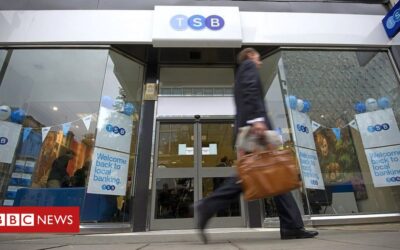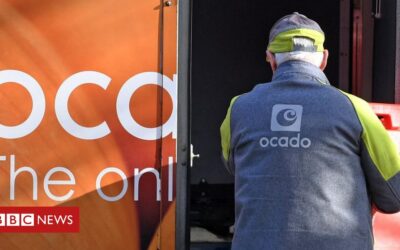By Leo KelionTechnology desk editorimage copyrightGoogleGoogle’s hardware chief has said its new flagship smartphone was designed to go on sale during an economic downturn.As a result, the Pixel 5 has abandoned some of its predecessor’s headline features and runs on a slower chip in order to be sold at a lower price.However, it does gain 5G connectivity and some new photography capabilities.Experts say it will face tough competition from other mid-range Android handsets, but the included bundle of Google services could help.”To not bring to market a true flagship demonstrates Google is now thinking about the market in a very different way than it was last year,” commented Ben Stanton from the tech consultancy Canalys.”And on a price-specs basis alone, Google will probably lose to Samsung and Chinese competitors. “Its key selling point, however, remains that it offers a stock Android experience with superfast updates.”This is a reference to the fact that many other Android device-makers layer their own proprietary user interfaces on top of Google’s operating system, and typically take longer to offer software updates.The Pixel 5 will cost $699/£599, and has a 6in (15.2cm) display and 128 gigabytes of storage. That compares to the $999/£929 price of last year’s top-end 6.3in Pixel 4XL.Google also unveiled a 5G-enabled version of its existing Pixel 4a, which will cost £499.Age of coronavirusSmartphone designs are typically locked in place many months before the products go on sale, in order to secure the required components and carry out tests.Google’s senior vice president of devices and services acknowledged that the Pixel 5’s features had been decided upon before the coronavirus pandemic began.But he said a deliberate choice had been taken to offer a 5G-capable phone at “an affordable price”.image copyrightGoogle”What the world doesn’t seem like it needs right now is another $1,000 phone,” said Rick Osterloh.”Obviously nobody anticipated the pandemic, but we actually did think that the world was possibly headed for an economic downturn… and it only further emphasised our point of view that this is the right thing.”Tech jettisoned from the Pixel 4 includes the Soli radar chip, which Google had taken five years to develop. It automatically turned on the older phone’s screen when its owner approached and allowed gesture controls.Last year’s face-unlock sensors have also been ditched, with a return to the Pixel 3’s fingerprint sensor on the back of the Pixel 5.”These technologies will be used in the future, but they’re very expensive,” Mr Osterloh said.The Pixel 5’s Snapdragon 765G chip is also rated as being slower and having lower graphics-processing performance than last year’s Snapdragon 855, although Mr Osterloh said he did not believe consumers would notice.image copyrightGoogleThe device does benefit from some improvements, including being able to produce a shallow-focus effect in “super low-light conditions”.One of its rear cameras now has a wider angle lens than before. And there are a choice of new video stabilisation modes.In addition, the RAM memory has been boosted to 8GB, which should help the phone switch from task-to-task more quickly.And Google is bundling some of its subscription services including three months of its games-streaming platform Stadia and 100 gigabytes of online storage.”Bundling three months of Stadia Pro cloud gaming with 5G Pixel phones is smart, because gamers benefit in particular from the 5G experience,” commented Ian Fogg from OpenSignal.”But cloud gaming is still ‘early’ tech for mobile.”image copyrightGoogleThe Pixel 5’s competition will include Samsung’s Galaxy S20FE and the forthcoming OnePlus 8T – which are also being targeted at the “mid-market”.Google shipped 4.6 million Pixel smartphones over the 12 months leading up to July 2020, according to research firm IDC.That marked a 37% drop over the same period a year earlier. However, a wider fall in demand for smartphones meant the brand still rose from being ranked 16th to 12th in terms of market share for the final quarter of each period.Google TVOther products unveiled at Google’s virtual event included Nest Audio – a redesigned version of its Google Home smart speaker, which now promises more bass and louder volumes.image copyrightGoogleGoogle is the second best-selling smart speaker brand in Western markets. But it is still forecast to sell about a third of the number of Amazon’s Echo speakers in the UK this year, according to research firm eMarketer.Google also showed off a new version of its television-streaming dongle, which is now called Chromecast with Google TV.Unlike its predecessors, the device comes with its own remote control, which allows users to control their TV and soundbar via its buttons or voice commands as an alternative to using a smartphone app.image copyrightGoogleIt also brings together movies and TV shows from the various apps each user subscribes to in order to make its own recommendations. The Apple TV set-top box and Amazon’s latest Fire TV stick both offer similar functions.Related TopicsVoice-activated technologyGoogleMore on this story
BBC Business News Articles
TSB to close a third of branches and cut 900 jobs
TSB will close 164 of its branches and cut 960 jobs, blaming “a significant shift in customer behaviour” as more customers bank online. The figure is in addition to the 82 branches it said it would close in November, when it set out plans to save £100m by 2022.A list of the affected branches and their closure dates has now been published after staff were informed.Union Unite described the move as “a dark day for the finance sector”.The bank said the closures were not an “easy decision” and had been accelerated by the pandemic. From the end of next year TSB will have 290 branches – down from 475 currently. The bank hopes most of the job cuts will come through voluntary redundancies, and said it would also create 120 new positions. Natwest to cut 550 jobs in branches
Co-op Bank to shed 350 jobs and close branches
It said branches with the lowest footfall would go.”Our customers are banking differently – with a marked shift to digital banking,” said boss Debbie Crosbie. “This means having the right balance between branches on the high street and our digital platforms, enabling us to offer the very best experience for our personal and business customers across the UK.” ‘Beggars belief’Unite’s national officer Dominic Hook said: “Unite has argued for some time that the financial services industry has a social responsibility not to walk away from its local customers who continue to need access to banking in bank branches.”It beggars belief that just seven years ago TSB had 631 local branches and this announcement will reduce that number to merely 290 branches. “Today, TSB has 475 branches. By the end of 2021, it will have 290.They are stark numbers for a bank that has always promoted itself as a community service, and once attacked rivals for cutting branches. The closure plan will be a blow to staff, aware of the wider economic outlook as they consider whether to volunteer for redundancy.It will also be a blow to customers who still like to use a branch, and to small businesses that hope to keep travel times to a minimum when depositing cash.Partnerships with the Post Office and cash collection services aim to mitigate these problems.But, while customer behaviour is changing across the bank sector, some people are being forced to bank in a different way – and they may not feel comfortable doing so.TSB is the latest bank to announce closures during the pandemic. In August the Co-operative Bank has said it will cut 350 jobs and close 18 branches due to the current “economic uncertainty” and the shift to online banking.Natwest Group also said it would cut 550 jobs in branches and close one of its remaining offices in London.Technical problemsTSB, which is owned by Spanish lender Banco Sabadell, has been dogged by technical problems, with an IT failure in 2018 leaving up to 1.9 million customers unable to bank online for several weeks.Customers were moved on to a new system, but an investigation found it had not been tested properly before going live. It cost TSB a total of £330m for customer compensation, fraud losses and other expenses.As recently as last month users were unable to access online banking. And last year, a “processing error” meant wages and other payments were not paid into some TSB customers’ accounts.
Fuller's pub chain says home working could cost one in 10 jobs
The boss of the pub chain Fuller’s has told the BBC he may have to lay off up to 10% of his staff – about 500 people.The government’s decision to encourage people to work from home will hit his firm’s city-centre pubs, Simon Emeny told 5live, leading to job losses.”We are doing everything possible to minimise that, but sadly it is inevitable,” he said.The warning follows other similar ones from JD Wetherspoon, Premier Inn and Beefeater owner Whitbread and Greggs.Mr Emeny also criticised the 10pm curfew on pubs and restaurants as “illogical” and “ill-conceived”.Fuller’s owns about 400 pubs and hotels in the UK, with many in the capital. It employs almost 5,000 people in its managed pubs and hotels.”The biggest challenge we have around job losses is in central London, because the current Prime Minister’s announcement last week to discourage people from going back to the office is having a big impact on city centres and in particular Central London,” he said.’Continual mistakes’He said he and his management team are still working out how many staff will have to be made redundant, “but it will be at least 10%”.Of Prime Minister Boris Johnson, he said, “I don’t think he’s had a good few months.””There are elements of the Prime Minister’s job that I don’t envy him but I also think there are significant elements where he has made continual mistakes and we have seen the government do u-turns on five or six key decisions,” he said.”In a business environment, his style of leadership wouldn’t work.”It sold its brewing business to Japan’s biggest brewer Asahi last year.The company said the £250m deal would preserve the Griffin Brewery in Chiswick, west London, where beer has been brewed since 1654.It left the company to focus on its hotels and pubs business, which generated most of its profits.Last week Whitbread, which owns Premier Inn and Beefeater, has warned that 6,000 staff could lose their jobs.The company blamed the cuts on a slump in hotel guest numbers since lockdown.Pub chain JD Wetherspoon has warned its 1,000 staff who work at airport venues that almost half of them could lose their jobs because of the dramatic fall in travel and tourism.And staff at around half of Greggs’ stores will have to accept fewer hours or face losing their jobs as the government’s furlough scheme comes to an end.The bakery chain, which employs 25,000 workers, expects business activity to “remain below normal for the foreseeable future”.
Ocado overtakes Tesco as most valuable UK retailer
Online grocer Ocado has overtaken Tesco in terms of stock market value as investors continue to bet on the firm.Ocado is now valued at £21.7bn, more than Tesco’s £21.1bn, despite having only a fraction of the UK grocery market share.Analysts said a rise in online food shopping, plus Ocado’s new tie up with Marks & Spencer, had encouraged investors.However, question marks remain as to whether Ocado is over-valued.According to analyst firm Kantar, Ocado has only 1.7% of the UK grocery market, compared with Tesco’s 26.8% share – which far outstrips its nearest competitors, Sainsbury’s and Asda.’Charity’ jibeOcado was launched 20 years ago but in most of those years struggled to make money. Ocado’s share price, which had been healthy after striking a number of big deals with overseas grocery businesses, began to climb quite quickly after the UK coronavirus lockdown in March.A former Tesco chief executive once described the firm as a “charity” because of the losses it had racked up in its early years.The business started to flourish in 2017 after cutting deals with US group Kroger, Casino in France, Sobeys in Canada, and ICA Group in Sweden. It then signed a partnership agreement with Coles in Australia.Its stock market valuation has largely been driven by how investors view its technology, which provides retailers with the infrastructure and software to build their online service and compete with giants such as Amazon. Market valueThat valuation picked up speed after the coronavirus crisis really started to bite in the UK and elsewhere in March as lockdown boosted demand for online groceries.Ocado’s share price got a further boost recently after its switch to delivering M&S food and after it reported a 50% jump in third quarter sales.Ocado says M&S switchover ‘successful’ after rocky start
Ocado halts staff deliveries temporarily amid order backlog
This was despite some customers criticising Ocado when it launched its M&S range, saying orders made weeks earlier had been cancelled at the last minute.The retailer also halted orders from its staff as it tried to clear an order backlog.ElephantDespite its popularity with investors, Neil Wilson, chief market analyst at Markets.com, questioned its market valuation.”Ocado holds enormous promise but whether it can deliver is quite another matter, the cash burn remains and the payback from all these overseas deals is taking a very long time,” he said.One of the reasons for Ocado’s valuation is the expected revenue from its overseas deals, but these “have been slow to materialise”, he said.While Ocado’s share price “has rocketed this year thanks to the boom in online retail”, one of the problems for Ocado is that “setting up fulfilment centres costs a lot and the returns are slow,” Mr Wilson said.He added that “investors put an enormous premium on growth so are prepared to pay a lot for any company that has a strong growth profile.”Julie Palmer, partner at Begbies Traynor, said the coronavirus pandemic had aided the firm: “Where there is crisis, there is opportunity. These words have never been truer for logistics businesses at the moment, which is one of the reasons that Ocado appeals to investors.”However, she said the challenge for the business is now to retain the growth it has seen since the Covid-19 outbreak.”There is an elephant in the room with Amazon, which could strike this sector hard with innovation through technology at any point,” she said.”This is a fact that must play on the mind of chief executive, Tim Steiner, and should make sure that he doesn’t become complacent,” Ms Palmer added.Amazon, which launched an online supermarket service in the UK in 2016, has been making further moves into selling groceries.These include a partnership with Morrisons, which said on Tuesday it would be taking on 1,000 permanent staff for its services on Amazon.
Work and Money: How do I pick an 'apocalypse-proof' career?
Sean and Reggie catch up with Pippa who’s at a crossroads after being made redundant. How does she pick an “apocalypse-proof” career? With an ever-changing patchwork of covid restrictions, can businesses still take clients out for lunch? And, what would negative interest rates mean for consumers?
Thousands have been waiting months for holiday refunds
There have been over 24,000 complaints to the UK’s competition regulator about package holiday refunds since the beginning of the Covid-19 pandemic. It comes as one of the UK’s biggest tour operators, TUI, has promised to clear its backlog of refunds by the end of September after an investigation by the Competition and Market Authority. Holiday companies are meant to refund cancelled holidays within two weeks, but thousands of people are still waiting for their money back – months after their holidays were cancelled.
Ex-Audi boss stands trial over 'dieselgate' scandal in Germany
Ex-Audi boss Rupert Stadler has become the first top executive to stand trial over Germany’s “dieselgate” scandal, which rocked the car industry in 2015.Mr Stadler appeared before a Munich court on Wednesday on charges including fraud, which he denies.Audi’s owner Volkswagen has admitted to installing software that was capable of cheating emissions tests in 11 million diesel vehicles worldwide.Not a single top executive has been convicted over the scandal in Germany.However, two VW employees have received jail terms in the US.Mr Stadler is accused of knowingly selling cars which had manipulated engine software and did not comply with environmental standards.When US regulators uncovered the scam in 2015, VW initially claimed it was the work of a handful of engineers, and that no senior managers were involved. Volkswagen in ‘dieselgate’ talks with motorists
Fiat offices raided over diesel emissions claims
But testimony from employees led prosecutors to remand Mr Stadler in custody for four months in 2018.Also in the dock are ex-Audi and Porsche manager Wolfgang Hatz and two former engineers, who also deny accusations of fraud. The accused face charges covering more than 434,000 VW, Audi and Porsche vehicles sold in Europe and the US. If found guilty, they face up to 10 years in jail, although a ruling isn’t expected until December 2022. Mr Stadler is not the only high-profile executive facing judgement. Former VW group boss Martin Winterkorn will also face trial on charges of fraud and stock market manipulation.VW’s current boss, Herbert Diess, and board chair Hans Dieter Poetsch faced similar allegations but those proceedings were dropped after VW agreed to a €9m settlement. The “dieselgate” scandal has already cost VW more than €30bn in fines, legal costs and compensation to car owners, mainly in the US.Rivals Daimler and Fiat Chrysler have since also faced accusations of emissions rigging.In April, VW settled Germany’s biggest lawsuit – agreeing to pay around €750m to 235,000 customers with affected cars.It is now trying settle with a further 60,000 claimants who want the carmaker to buy back their diesel vehicles.
'Chicken Licken' views will hold us back, says Bank economist
Pessimistic “Chicken Licken” views about the economy are in danger of holding back the UK’s post-lockdown economic recovery, according to Bank of England economist Andy Haldane.”Encouraging news about the present needs not to be drowned out by fears for the future,” he said in a speech.He compared negative forecasters to the children’s storybook character who feared the sky would fall.”Now is not the time for the economics of Chicken Licken,” he said.”My concern at present is that good news on the economy is being crowded out by fears about the future,” he added.”Collective anxiety is as contagious, and could be as damaging to our well-being, as this terrible disease.”Mr Haldane said the UK faced an “unholy trinity of risks from Covid, unemployment and Brexit”, but it was important not to overlook the economy’s quicker-than-expected recovery from lockdown.”The economy has already recovered just under 90% of its earlier losses. Having fallen precipitously by 20% in the second quarter, we expect UK GDP to have risen by a vertiginous 20% in the third quarter – by some margin its largest-ever rise,” he said.However, he admitted that the economic news had not all been positive, with job losses continuing to mount, while the recovery in consumer spending had not been matched among businesses.Bank of England policymaker defends negative rates
Bank deputy governor warns against negative rates
His latest intervention comes amid growing speculation that the Bank of England is contemplating cutting interest rates so much that they fall below zero.At present, the Bank’s rate is at an all-time low of 0.1%.Different members of the Bank’s Monetary Policy Committee have put forward both sides of the argument in recent days.In his speech on Wednesday, Mr Haldane said none of the conditions that would justify negative interest rates had been met.
Kylie Jenner's make-up firm warns of Shopify data breach
image copyrightPress AssociationKylie Jenner’s make-up company has warned customers of a security breach compromising names, addresses and the last four digits of credit cards.Shopify said two “rogue” support-team workers had stolen customer data from at least 100 sellers on its platform.Kylie Cosmetics said it was among those affected but was confident customers could continue to buy on its Shopify-run website.”Your trust is so important to us,” the company told them in an email.”And we wanted to let you know we’re working diligently with Shopify to get additional information about this incident and their investigation and response to this matter. “Shopify has assured us that they have implemented additional controls designed to help prevent this type of incident from recurring in the future.”Shopify: Canadian tech champion taking on AmazonForbes drops Kylie Jenner from billionaire listimage copyrightGetty ImagesLast year, billionaire Kylie Jenner – who rose to fame on TV series Keeping Up with the Kardashians – sold most of her shares in the company, for $600m (£463m).Beauty giant Coty now controls 51% of the 23-year-old’s cosmetics brand.More than one million merchants use Shopify, including Taylor Swift, Victoria Beckham and Tesla.Related TopicsKylie JennerCosmeticsMore on this story
Boohoo profit soars despite factory conditions row
Fast-fashion brand Boohoo’s first-half profit has risen 51%, despite a storm over pay and working conditions for those making its clothes.Last week, a review of Boohoo’s supply chain identified “many failings” after concerns were raised about its suppliers in Leicester.The online retailer said it was taking steps to make “substantive, long-lasting and meaningful change”.It also raised its prediction for this year’s income.”Group revenue growth for the year to 28 February 2021 is expected to be 28-32%, up from approximately 25% as previously guided,” it said in its interim results statement.Pre-tax profits surged to £68.1m in the six months to 31 August, up from £45.2m a year earlier.During that time, the company made a number of acquisitions, adding Oasis, Warehouse and Pretty Little Thing to its portfolio of brands, which include the more upmarket Karen Millen and Coast.Active customer numbers in the last 12 months went up by 34% to 17.4 million, with an “exceptional increase” during lockdown.Boohoo: Five things you may not know about the fashion firmDespite the positive outlook, Boohoo said it was “prudent to continue to plan for a period of economic uncertainty in the second half of the financial year, including possible reduced consumer spending”. “It is also prudent to plan for return rates returning to normal levels,” it added.Prospects undentedBoohoo commissioned the independent review by barrister Alison Levitt after allegations that factory workers had been exploited during the coronavirus lockdown.Ms Levitt found some workers in its supply chain had not always been properly compensated for their work and that many were not fully aware of their rights and their obligations.She said Boohoo had “capitalised on the commercial opportunities offered by lockdown”, but took no responsibility for the consequences for those making the clothes they sold.The review also found senior directors at Boohoo knew about “serious issues” over how workers were treated months before they came to light.Richard Hunter, head of markets at Interactive Investor, said the “furore” surrounding the company’s Leicester supply chain had done little to harm its profits or prospects.”This will, of course, come at a cost and the possibility of wider investigations cannot be ruled out at the moment. However, any reputational damage caused by the allegations has not filtered through to a very strong set of numbers.”He added: “For the moment, the stellar growth continues for Boohoo, as does a share price which has fully recouped the declines of July to stand up 31% in the year to date and ahead by 48% over the last year.”









